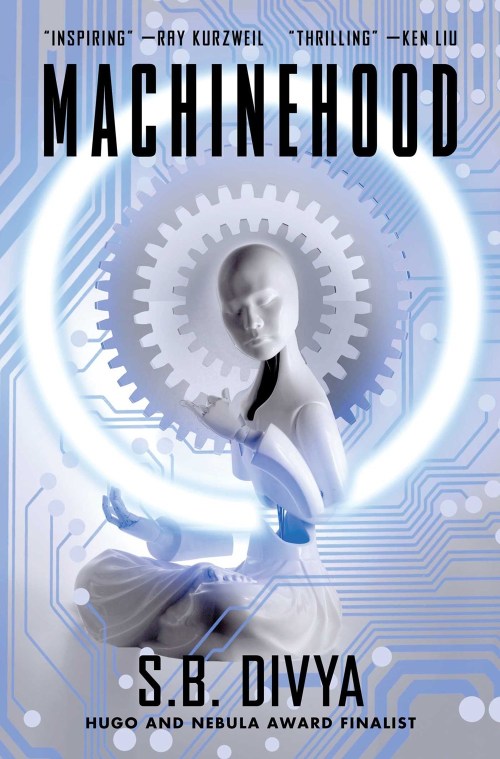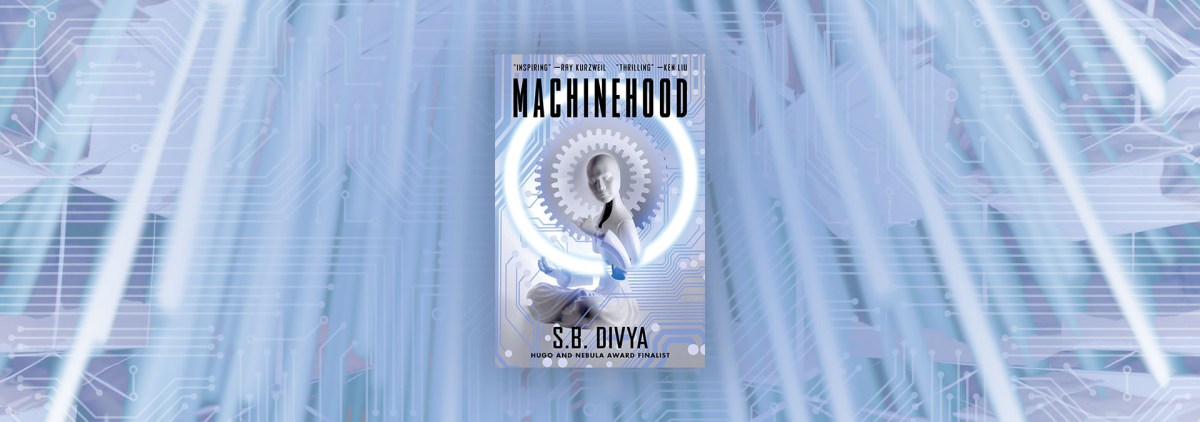[ad_1]
Exploring the problems of the gig economy and pondering the rights of artificial intelligence, S.B. Divya’s debut novel, Machinehood, is packed with ideas. The setting is arguably a dystopia, but the plot is action-packed and character-driven enough that you might not notice. Somewhat hampered by clunky exposition and unexamined assumptions, the novel is nonetheless digging into near-future economic and political anxieties in interesting ways.
Set in the late 21st century, Machinehood primarily follows Welga Ramírez, an ex-Marine who now makes her living as a bodyguard for the wealthy. Struggling to keep up with automation in an almost totally gigified economy, humans use a variety of chemical and nanomachine “pills” to stay competitive: “Buffs make us stronger. Zips make us faster. Flows make us smarter.” When a powerful and mysterious terrorist group — the Machinehood — demands an end to pill manufacture and equal rights for AI, Welga throws herself into the battle to stop them.
The novel’s depiction of life under a total gig economy is fairly plausible and extremely bleak. We get most of this perspective from Nithya, Welga’s sister-in-law, who struggles to decide when to pay for air conditioning or the dishwasher, even as she works gigs as a biogenetic researcher. Machinehood doesn’t go very far in its critique, unfortunately. Except for the Machinehood’s demands for human-machine integration, no characters consider root causes of the system’s problems. Similarly, it broaches the issue of reproductive rights without really digging in: Nithya, despite living in India, is prevented from getting a legal abortion when her American husband refuses to give his permission, but that plotline revolves around their reconciliation, not the fundamental injustice.
Machinehood winds up smuggling in some really problematic ideas, maybe accidentally. Most glaringly, the novel (or at least the characters within it) seem to assume that trickle-down economics is something other than a massive con, strongly implying a bogus “job creator” theory of wealth in naming the wealthy “funders.” This is especially disappointing given the potential to think through alternative economies — while Machinehood does lean a lot on the idea of crowdfunding with its virtual “tip jars,” it’s really not doing the kind of radical imagining of, for example, Cory Doctorow’s post-scarcity reputation economies in Walkaway and Down and Out in the Magic Kingdom, or Kim Stanley Robinson’s attempts to re-envision finance for planetary sustainability in New York 2140 and The Ministry for the Future. Centering labor injustice and automation without even mentioning any form of labor organization or welfare policy is a strange choice.
Even setting aside these neoliberal assumptions, there are a number of worrying ideas embedded in Machinehood. My hackles immediately rise, for example, over an American protagonist whose big dream is to convince her cowardly superiors to begin a military invasion of a North African Islamic nation — a frequently-referenced bogeyman throughout most of the novel, it’s especially disturbing that “the caliph” is never even named. Additionally, Welga’s plan for civilian life is to open a “slow-fast-food” restaurant, where human line-cooks will take speed- and stamina-enhancing drugs to compete with the fully-automated competition. It’s a nightmarish vision for anyone who has worked in food service, and a red flag that no one in the book calls it out as such.
In its assumption that universal surveillance will lead to the elimination of crime and that any disruption of surveillance will lead to roving gangs of thugs, as well as a disturbingly violent scene involving a drug dealer, Machinehood has what I can only call “big cop energy.” That’s especially troubling coupled with its bizarre redefinition of “protestors.” In Machinehood, “protestor” is synonymous with “terrorist”. The “protes” that Welga protects her “funders” from set bombs, shoot at their targets with real guns, and deploy murderous robots, thus justifying Welga and the other “shields” in their warrior cosplay (that they rarely kill anyone because of advanced medical technology feels irrelevant). It’s a troubling ideological move, especially reading this after a year of aggressive, militarized police response to peaceful protests across America.
Science fiction can be given a lot of leeway for exposition, but the first third or so of Machinehood is filled with enough awkward mid-conversation info-dumping that it breaks the flow of the story. Important elements of plot and character motivation don’t hold up to much scrutiny, and, despite feeling fairly wordy, it’s a strangely under-described world — only Nithya’s home city of Chennai has much of a sense of place, and many of the science fictional elements, like robots and space stations, are barely described. The lack of noteworthy robot or AI characters in a story purportedly about their independence is hard to miss; I couldn’t help comparing this to Ted Chiang’s The Lifecycle of Software Objects and Annalee Newitz’s Autonomous, which have similar concerns but actually let the AI speak. Here, only Welga and Sithya’s virtual assistants get any attention, and they don’t feel terribly advanced from modern programs like Siri or Alexa.
Machinehood might be less troubling if it were more overtly dystopian, or at least clear on which elements its characters want to change. While we do learn a more sympathetic view of both the Machinehood terrorists and the Maghreb caliphate, and while there is something of a brighter future possible at the end of the story, the novel has a constellation of troubling ideas that it fails to question. Bradbury said of his dystopia, Fahrenheit 451, that he wasn’t trying to predict the future, but rather to prevent it — the most disturbing aspect of Machinehood might be that it’s too late to prevent its most dystopian features.

FICTION
Machinehood
By S.B. Divya
Gallery / Saga Press
Published March 2, 2021

[ad_2]
Source link
